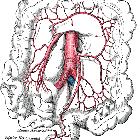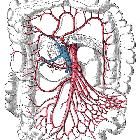Arteria mesenterica inferior





The inferior mesenteric artery (IMA) is one of the three non-paired major visceral arteries in the abdominal cavity arising from the abdominal aorta and supplying the hindgut. It is the smallest of the three anterior visceral branches of the abdominal aorta.
Gross anatomy
Location
Located within the mesentery of the hindgut, passing to the left of the midline.
Origin
Unpaired vessel from the anterior aspect of the abdominal aorta at the L3 level, at the lower edge of the third part of duodenum.
Course
The IMA runs obliquely downwards towards the pelvic brim, initially anterior and then to the left of the aorta. After giving off the left colic and sigmoid arteries, it crosses the origin of the left common iliac artery at the sacroiliac joint medial to the ureter, with the inferior mesenteric vein lying between the two. Within the pelvis, it continues along the pelvic wall as the superior rectal artery in the root of the sigmoid mesocolon.
Branches
- left colic artery
- two to four sigmoid arteries
- superior rectal artery (terminal branch)
Supply
- splenic flexure of large bowel to the upper two thirds of the rectum
Relations
- anterior: third part of the duodenum
- posterior: abdominal aorta, left psoas, sympathetic trunk, left common iliac artery, hypogastric nerve
- lateral (left): inferior mesenteric vein
The left colic and sigmoid branches of the IMA cross anterior to the ureter.
Variant anatomy
- doubled IMA
- absent IMA
- common trunks (e.g. left colic and rectosigmoid, rectal and colosigmoid)
- absent left colic branch
- Arc of Riolan (SMA/IMA connection)
Siehe auch:
- Arteria mesenterica superior
- Aorta abdominalis
- superior rectal artery
- Arteria colica sinistra
- Beckenarterien
- sigmoid arteries
und weiter:

 Assoziationen und Differentialdiagnosen zu Arteria mesenterica inferior:
Assoziationen und Differentialdiagnosen zu Arteria mesenterica inferior:


